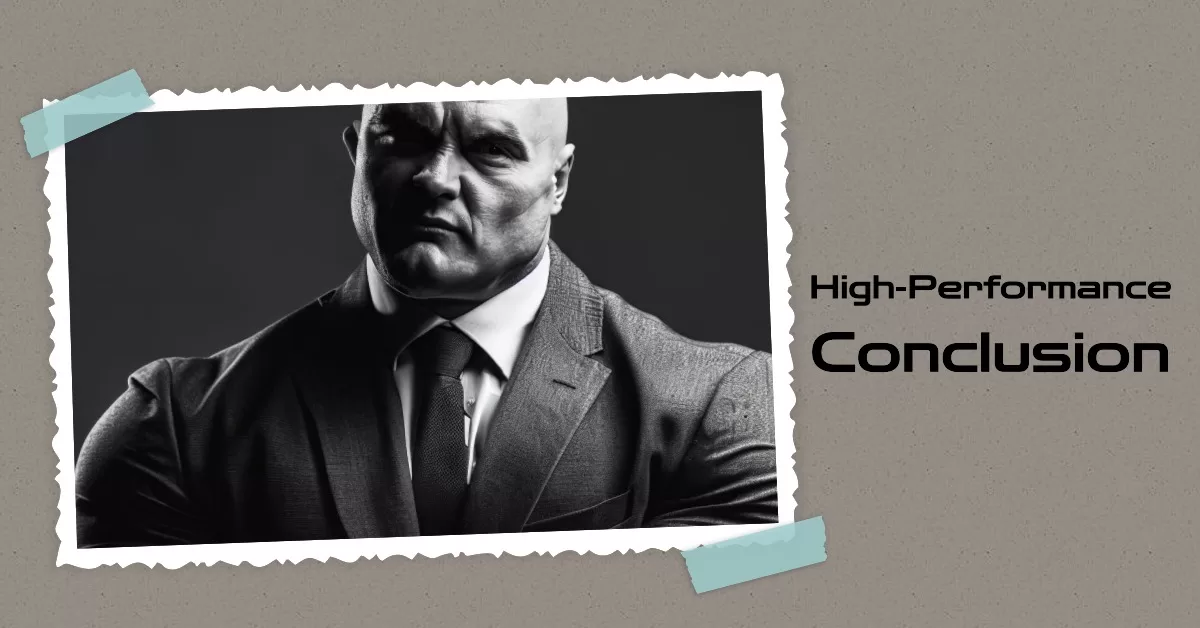In today’s competitive landscape, individuals looking to reach their full potential and excel in their personal and professional lives need a powerful ally. A high-performance coach is uniquely qualified to help people achieve their goals and become the best version of themselves. This article will explore the role of high-performance coaches, their unique coaching skills and methodologies, and how they can help individuals achieve peak performance and maximize their potential.
Table of Contents
- 1 What Does a High-Performance Coach Do?
- 2 How Does the Coaching Model Differ from Traditional Life Coaching?
- 3 What Coaching Skills Do High-Performance Coaches Have?
- 4 How Do High-Performance Coaches Work with Clients to Improve Job Performance?
- 5 What Sets High-Performing Coaches Apart from Other Performance Coaches?
- 6 What Techniques Do High-Performance Coaching Use?
- 7 High-Performance Questions
- 7.1 Q: What Is the Role of a High-Performance Coach in Achieving Full Potential?
- 7.2 Q: How Can a High-Performance Coach Help in Taking Performance to the Next Level?
- 7.3 Q: What Qualities Should a Good High-Performance Coach Possess?
- 7.4 Q: How Do High-Performance Coaches Work With Individuals and Teams?
- 7.5 Q: What Distinguishes High-Performance Coaching From Other Types of Coaching, Such as Executive Coaching?
- 7.6 Q: Can a High-Performance Coach Help an Individual Who Is Already Performing Well?
- 7.7 Q: What Tools and Techniques Do High-Performance Coaches Use?
- 7.8 Q: How Important Is Full Engagement in the High-Performance Coaching Process?
- 7.9 Q: Can Business Leaders Benefit From Working With a High-Performance Coach?
- 7.10 Q: How Can Performance Coaches Help Clients Navigate the Steps They Need to Take to Reach Their Goals?
- 8 Summary: High-Performance Coaches Help High-Achievers Unleash Their True Potential
What Does a High-Performance Coach Do?
High-performance coaches work with people who want to excel over their competitors at whatever they are doing for a living. They often help their clients raise self-awareness and strengthen their weak links through performance coaching and mental conditioning strategies. High-performance coaches can make their coachees more resilient, mentally tough, and emotionally intelligent using various strategies. Some of these strategies are listed below.
Assessing Your Current Performance Level
A high-performance coach begins by evaluating the coachee’s current performance level. They identify strengths and weaknesses to determine what skills and capabilities need improvement. By understanding the performance baseline, the coach can tailor their coaching approach, ensuring that the individual reaches their full potential.
Setting Realistic and Achievable Goals
Goal setting is crucial for personal and professional success. High-performance coaches work with clients to establish specific, measurable, achievable, relevant, and time-bound (SMART) goals. By clearly defining objectives, individuals can develop a roadmap to success and maintain focus on the path to improved performance.
Developing a Personalized Action Plan
Once goals are established, high-performance coaches collaborate with clients to develop a strategic action plan. This plan serves as the foundation for ongoing coaching sessions, enabling the coach to provide targeted guidance and feedback, ultimately empowering the individual to reach their highest potential.
How Does the Coaching Model Differ from Traditional Life Coaching?
High-performance coaching (HPC) differs from life coaching. HPC is aimed at people who want to achieve extraordinary results – usually in competitive niches. It’s not about simply making one’s life happy, but about achieving the maximum potential they can possibly express. HPC means sacrifice; HPC means hard work and dedication. HPC is for people who want to be the best and never stop before they realize their objectives.
Focus on Specific Performance Areas
High-performance coaching is about helping individuals excel in specific areas of their lives rather than general self-improvement. Unlike life coaching, which tends to be more holistic, high-performance coaching focuses on the skills and strategies needed to achieve peak performance in the desired area.
Emphasis on Results and Measurable Outcomes
The high-performance coaching model is results-driven, with measurable outcomes being a central aspect of the framework. Coaches track progress against established objectives, ensuring that their clients stay on track and continuously work toward peak performance.
Accountability and Ongoing Support from the Coach
High-performance coaches provide ongoing support and guidance to clients throughout the coaching process. By maintaining open communication and holding individuals accountable for their progress, coaches can effectively facilitate sustained success and personal growth.
What Coaching Skills Do High-Performance Coaches Have?
High-performance coaches can be trained in specific areas and possess skills that are aimed at helping a certain niche or in the fundamental coaching techniques that often involve mental conditioning and biohacking strategies as support skills. There are coaches who work with basically anyone and help them maximize their general performance levels in various areas of life and there are also coaches who work only with a specific type of clients that need guidance in business, investing, professional sports, or highly demanding intellectual tasks. Depending on the client’s needs, the skills that the coach must possess will vary.
However, there are some general skills that a life coach should possess and they include:
Active Listening and Powerful Questioning Techniques
Effective communication is central to coaching success. High-performance coaches employ active listening and powerful questioning techniques, allowing them to gain deep insight into their clients’ needs and struggles, ultimately providing targeted guidance and support.
Expertise in Various Performance Improvement Methodologies
High-performance coaches are well-versed in an array of techniques and approaches designed to enhance performance. By selecting and applying specific, evidence-based methodologies, these coaches can accelerate the development of the skills and capabilities required for peak performance.
Ability to Inspire and Motivate Clients to Reach Their Full Potential
The most effective high-performance coaches possess the ability to inspire and motivate their clients, driving them to reach and surpass their goals. Through their passionate commitment to their clients’ success, these coaches become invaluable partners in the pursuit of personal and professional excellence.
How Do High-Performance Coaches Work with Clients to Improve Job Performance?
High-performance coaches play a critical role in facilitating professional growth and enhancing job performance among their clients. They employ a systematic and structured approach to identify underlying issues, establish specific goals, and design tailored strategies that cater to individual needs. Recognizing that optimal work performance stems from a delicate balance of cognitive, emotional, and interpersonal competencies, these coaches endeavor to foster a comprehensive development plan encompassing all dimensions.
Utilizing various assessment tools and performance indicators, high-performance coaches collaborate with clients to set achievable yet challenging targets that align with their professional aspirations. Through constructive dialogue, coaches facilitate a deeper understanding of personal strengths and areas for improvement while encouraging self-reflection and accountability. By providing feedback on progress and reinforcing positive behaviors, they effectively guide clients in overcoming obstacles and addressing competency gaps.
Moreover, high-performance coaches create a conducive learning environment that empowers clients to experiment, learn, and adapt to new job demands. They stimulate critical thinking and problem-solving skills by posing thought-provoking questions and promoting self-directed learning. In doing so, clients are better equipped to embrace change, enhance decision-making abilities, and ultimately achieve sustainable improvement in their job performance.
High-performance coaching involves a synergistic partnership built on trust, transparency, and commitment to excellence. Through a combination of strategic goal-setting, self-reflection, and skills development, these coaches enable clients to unlock their full potential and realize their professional goals.
Identifying Areas of Strength and Areas for Improvement
To effectively enhance job performance, high-performance coaches work closely with clients to evaluate their strengths and identify areas requiring improvement. This understanding enables the coach to tailor their coaching approach to the individual, ensuring maximum results and enhanced performance at work. This process aids in developing a high-performance mindset.
Developing Strategies to Overcome Obstacles and Challenges
Clients often face numerous obstacles and challenges in their quest for peak performance. High-performance coaches are adept at devising innovative strategies and techniques to overcome these hurdles, empowering clients to excel in even the most difficult of circumstances.
Tracking Progress and Celebrating Achievements
Regular progress monitoring is a key aspect of long-term success. High-performance coaches continually track client progress against their goals, adjusting strategies and tactics as needed, while celebrating achievements and milestones to keep individuals motivated and committed to their personal growth journey.
What Sets High-Performing Coaches Apart from Other Performance Coaches?
High-performing coaches distinguish themselves from other performance coaches through their exceptional commitment to growth and results-driven strategies. These individuals possess an innate ability to recognize the unique potential in each individual, designing tailor-made programs that maximize their strengths and address their weaknesses. By employing cutting-edge methodologies, fostering a growth mindset, and maintaining a relentless focus on key performance indicators, these coaches consistently elevate their clients above mere competence to true excellence. Moreover, high-performing coaches remain dedicated to their own personal development and adaptability, ensuring that they remain indispensable in inspiring peak performance in their clients throughout an ever-evolving landscape.
A Proven Track Record of Success with Clients
High-performing coaches have a history of successfully helping clients reach their full potential and achieve their goals. Positive outcomes and client testimonials attest to the effectiveness of their coaching methods and their ability to deliver measurable results.
A Commitment to Continuous Learning and Self-Improvement
High-performing coaches understand the value of ongoing education and growth, both for themselves and their clients. These professionals are committed to staying abreast of industry trends and best practices, ensuring that they can offer the most up-to-date guidance and support to their clients.
A Collaborative and Results-Driven Approach
High-performing coaches operate from a collaborative mindset, working closely with clients to create a partnership focused on shared success. Through this collaborative dynamic, coaches can effectively guide individuals toward their goals, fostering sustained personal and professional growth.
What Techniques Do High-Performance Coaching Use?
Some of the most effective coaching techniques and tools include the 5-minute pre-session check-in, the Wheel of Life, the Perfect Day exercise, and the use of reflection journals. These tools help clients recognize their progress, set clear goals, and identify roadblocks. Apart from that, coaches also use powerful questions formed in a specific manner (using performance psychology principles) to help clients reflect on their behaviors, thoughts, and emotions. Additionally, power performance strategies might be used to work on the mindset, mental conditioning, and mental performance levels.
5-Minute Pre-Session Check-In
This technique involves a brief conversation with the client before the session begins to review their current status, progress, and any challenges they may be facing. It helps to set the tone for the session and ensure that the coaching session is focused on the areas that need the most attention as well as reduces stress and anxiety by ensuring the client that they are being looked after.
Wheel of Life
This is a visual representation of the different areas of a person’s life, such as career, relationships, health, and personal growth. The client rates their satisfaction in each area on a scale of 1 to 10, allowing them to identify which areas need the most attention and improvement. This exercise helps clients gain a better understanding of their overall wellbeing and set goals based on their individual priorities as well as help them find balance in their lives.
Perfect Day Exercise
This technique involves asking clients to describe or visualize their “perfect day” in terms of various aspects of their life, such as personal relationships, professional achievements, and other life areas. This exercise helps clients gain clarity on their values, goals, and what they want to achieve in their life. This clarity allows them to set specific, actionable goals and plans to make their perfect day a reality.
Reflection Journals
Encouraging clients to keep a reflection journal allows them to track their progress, thoughts, and feelings throughout the coaching process. This self-reflection tool enables clients to become more aware of their patterns, progress, and obstacles, making it easier for them to overcome barriers and achieve their goals. It can also help to analyze past performance and compare it to what’s happening now; by finding patterns and relationships between one’s mental states and performance levels, journaling can also help in establishing appropriate mental conditioning strategies.
Powerful Questions
An essential tool for coaches is the ability to ask powerful, open-ended questions that encourage deep thinking and self-discovery. These questions help clients explore their thoughts, feelings, beliefs, and motivations, uncovering insights that can lead to breakthroughs in their personal and professional development. By utilizing performance psychology principles when designing these questions, coaches can point them in the right direction, thus leaving the client in a highly-motivated state.
High-Performance Questions

Welcome to the Q&A section where we will shed some light on the commonly asked questions related to high-performance coaching (HPC). Here, you will find answers to the dilemmas you might still have after reading the article.
Q: What Is the Role of a High-Performance Coach in Achieving Full Potential?
A: A high-performance coach aids in unlocking an individual’s full potential by identifying their strengths and weaknesses, setting attainable goals, and developing a tailored action plan to help them become a high performer. By providing support, guidance, and accountability, they enable clients to reach their next level of performance in both their personal and professional lives.
Q: How Can a High-Performance Coach Help in Taking Performance to the Next Level?
A: A high-performance coach works closely with clients to identify areas for improvement, providing the tools, strategies, and insights needed to excel. Through a structured coaching program, they offer personalized support to help clients break through barriers, build resilience, and optimize their performance. This process enables individuals to consistently achieve high levels of success and meet or exceed their goals.
Q: What Qualities Should a Good High-Performance Coach Possess?
A: Effective high-performance coaches possess strong communication skills, empathy, and a deep understanding of their clients’ goals and aspirations. They are skilled in identifying and overcoming challenges faced by high performers and can draw upon a wealth of experience, industry knowledge, and research to develop tailored coaching strategies that drive results.
Q: How Do High-Performance Coaches Work With Individuals and Teams?
A: High-performance coaches work with individuals and teams by identifying areas for improvement, setting goals, and devising practical strategies to help clients excel. They provide regular feedback and support, helping clients to develop new skills, overcome obstacles, and sustain high levels of performance. Through ongoing collaboration, they enable clients to drive lasting change and achieve their desired outcomes.
Q: What Distinguishes High-Performance Coaching From Other Types of Coaching, Such as Executive Coaching?
A: High-performance coaching differs from executive coaching in that it focuses specifically on helping individuals and teams consistently achieve top-level performance and results in their chosen fields. While executive coaching may target broader leadership development and business management skills, high-performance coaching aims to enhance specific performance-related aspects to maximize success.
Q: Can a High-Performance Coach Help an Individual Who Is Already Performing Well?
A: Absolutely. A high-performance coach can help even those individuals who are already performing at a high level by identifying potential areas for growth, refining existing capabilities, and pushing them to achieve even greater heights. The goal of high-performance coaching is not only to sustain good performance but to consistently excel and reach peak levels of achievement.
Q: What Tools and Techniques Do High-Performance Coaches Use?
A: High-performance coaches use a range of tools and techniques, including but not limited to assessments, goal setting, action planning, regular check-ins, and performance tracking. They may also employ professional coaching models and frameworks to help clients build the necessary skills for achieving high-performance levels and unlocking their full potential.
Q: How Important Is Full Engagement in the High-Performance Coaching Process?
A: Full engagement is essential to the high-performance coaching process, as it allows clients to immerse themselves in the process, make progress toward their goals, and maintain momentum toward achieving high levels of performance. Research shows that those who actively engage in the coaching process and successfully apply the provided tools and strategies are more likely to reap the rewards of improved performance.
Q: Can Business Leaders Benefit From Working With a High-Performance Coach?
A: Absolutely. Business leaders can benefit significantly from working with a high-performance coach. By partnering with a coach, leaders can uncover new strategies to optimize their performance, work on their leadership skills, identify and overcome challenges, and develop the skills they need to excel in their roles, both personally and professionally. This, in turn, positively impacts their ability to drive the success of their organizations.
A: Performance coaches help clients navigate the necessary steps to reach their goals by providing structured, personalized support. They work with clients to identify and address specific challenges, share practical tools and strategies to enhance performance and provide accountability to ensure progress is made toward achieving their objectives. A performance coach can help an individual advance in their career, improve their personal life, or reach peak performance levels on a consistent basis.
Summary: High-Performance Coaches Help High-Achievers Unleash Their True Potential

High-performance coaching is an invaluable resource for those seeking to reach their full potential and excel in their personal and professional lives. By partnering with a dedicated high-performance coach, individuals can access the tools, strategies, and support they need to overcome obstacles and transform their performance, ultimately achieving lasting success. High-performance coaching not only facilitates personal growth but also fosters the development of key skills necessary for success in various facets of life. By empowering individuals to set and accomplish meaningful goals, develop a growth mindset, and cultivate effective habits, high-performance coaching serves as a catalyst for sustainable and quantifiable results.
Through a personalized and holistic approach, high-performance coaching takes into account individual strengths and weaknesses, helping clients identify areas of improvement and create actionable plans to progress. By providing expert guidance, ongoing encouragement, and constructive feedback, coaches can help clients overcome self-doubt, develop resilience, and maintain motivation even in the face of adversity. Moreover, high-performance coaching equips clients with valuable tools and resources to enhance their communication, leadership, time management, and problem-solving skills. These transferable abilities can prove invaluable not only in professional settings but also in personal relationships and overall wellbeing.
In a nutshell, high-performance coaching is an essential asset for anyone looking to unlock their full potential, overcome barriers, and achieve exceptional results in every aspect of their lives. With the right high-performance coach, individuals can harness the power of transformational growth and ultimately create long-lasting, positive change.




